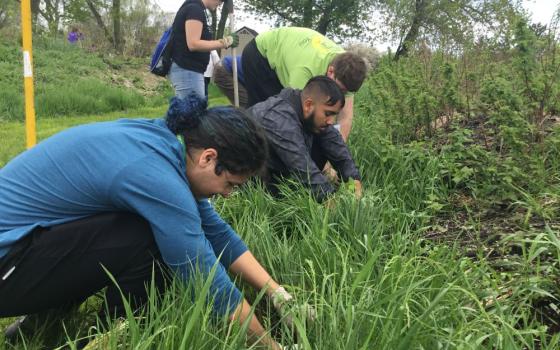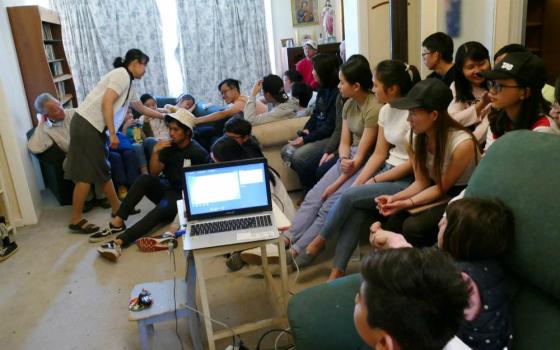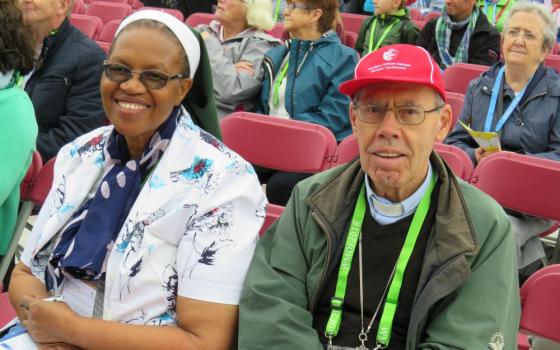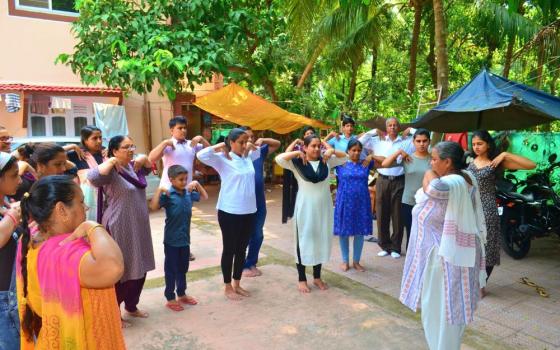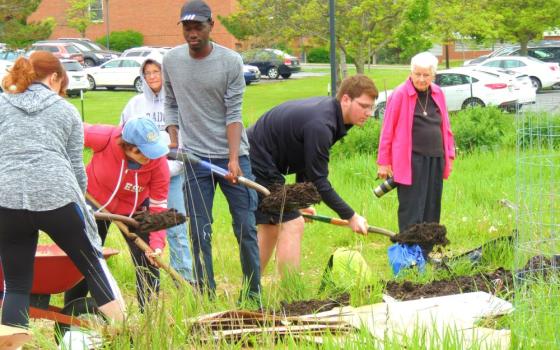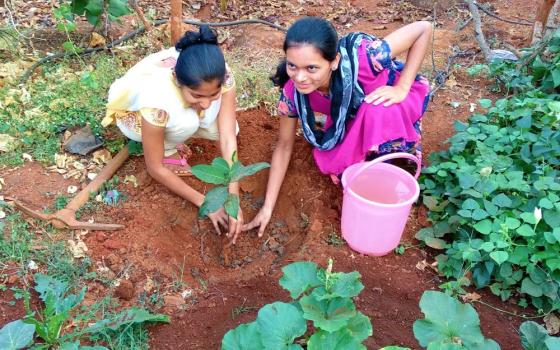Has the church left young people? Do youth have enough adult leadership? Are we listening to their wisdom? Is the church truly home? Do they feel responsible and valued? These were all questions the panelists raised this month in their responses to the following question:
We read that teens and young adults are "leaving the Catholic Church." Choose one aspect to discuss: What would you have liked to say to the bishops attending last month's youth synod? Are there ways we can learn from Catholic youth experiences and communicate with them? What is your community doing?
______

Lilian Bong is a Sister of St. Joseph of the Apparition in Western Australia. Born in Malaysia and trained as a nurse, she did medical mission outreach in Myanmar before making her final profession in 2016. Now she serves as second councilor to the provincial, does vocation and mission appeal work, and has a special ministry to elderly Chinese people.
Let me share two examples of how Catholics perceive the younger generation. The first was at our recent provincial chapter. We had engaged a prominent Catholic lawyer, one of the board of directors for Catholic Health Australia, to speak about the upcoming 2020 Plenary Council of the Australian bishops.
When she spoke on young people and church, the first thing she expressed was disappointment that the younger generation is no longer interested in going to church. I asked her whether she was aware that the archdiocese and the Catholic Youth Ministry (CYM) hold an annual Veritas Festival for young Catholics (with catechesis, live band and music, games, vocation stalls) at different Catholic schools and universities. More than eight hundred young people attended this event. She "wasn't aware of this at all."
The second example is from a seminar about the Plenary Council. We gathered into groups for sharing on the topic of young people in the Catholic church, and a priest began with the same remark that young people are no longer interested in attending church. I asked the same question as before. He was not aware that young Christians came to such events.
Do some tend to generalize that the younger generation is no longer interested in faith or spiritual encounters?
This year I presented on two separate occasions to educators and young people on the theme: "Open New Horizons for Spreading Joy: On Young People, Faith and Vocational Discernment."
At that gathering of families, school personnel, parish and religious communities, I asked them to reflect upon four main areas: discernment; accompaniment (we are called to walk with young people on their faith journey, starting from where they are rather than where we think they should be); listening (actively listen to our young people and as listeners, to be ready to change our hearts so as to be ready to listen even when we are challenged by what we hear); creating (a safe, welcoming environment thus making an inviting space for young people).
In Amoris Laetitia, Pope Francis mentioned that education in the faith has to adapt to each child, since older resources and recipes do not always work. Children need symbols, actions and stories. Adolescents usually have issues with authority and rules, so they need attractive testimonies that win them over by their sheer beauty. And it is essential that children actually see that prayer is something truly important for their parents.

Letta Mosue belongs to the Congregation of St. Brigid from the Rustenburg Diocese, South Africa. She has been an educator, clinical psychologist and specialist in trauma counseling and ministered in university and police correctional services. She now works in private practice and at an oncology clinic while serving as superior general of her congregation.
No Sister of St Brigid is assigned for Catholic youth ministry in the three dioceses where we minister. There are no collaborative programs either, but everybody does what they can.
Youth lack adult leadership. Most adults are not confident in working with youth, not knowing how to help them. Some parents are even afraid of their children! Others are busy and have little time for their teenage children. There is lack of mentorship in our parishes, in which the majority of children come from broken homes, single parent homes, and sometimes are teenage parents themselves.
There is no diocesan program for youth in Rustenburg Diocese, Southern Africa. Since 2013, I have been doing parish family-focused ministry, but there is little attendance from the parishes. I ran a workshop in 2016 on parent/child dialogue for 9- to 15-year-olds and some parents; in 2017, I held one on "Who do you think you are and who are you meant to be" for a group of youth and young adults in my parish; in 2018, I gave a vocations workshop for four groups of 8- to 17-year-olds in collaboration with four young sisters from Botswana.
In Southern Africa we have an organization of three diocesan congregations, the "ABCs" — Companions of St. Angela, the St. Brigid Sisters, and the Calvary Sisters— which collaborate in several ways. At the 2017 ABC bi-annual meeting we discussed: "What action can we take as congregations for youth?" In our 2018 March meeting, the ABC superiors general decided that youth ministry would be an ideal joint witness.
Erna Rheeder, coordinator of the Family Network, is running three workshop programs: Ubaba Unathi ("Dad is with us") to assist those growing up without a father and encouraging paternal involvement; Botswadi ("parenting"); and "Rebuilding Dreams" (for youth and young adults).
I already trained in Ubaba Unathi; this October I took "Rebuilding Dreams," and I will take Botswadi in November. I hope to train some other sisters from ABC to empower youth and young adults to take charge of their lives regardless of their personal challenges.
Before the World Meeting of Families in Ireland, I had made a commitment to accompany a parish youth and young adults group. At the meeting, I heard a survivor of human trafficking blame her family (the very "structure of belonging") for failing her; I was strengthened in my resolution to journey with these young people and through them to reach their families.

Margaret Gonsalves is a Sister for Christian Community and feminist theologian active in the Ecclesia of Women in Asia and Indian Women Theologian's Forum. As founder of ANNNI Charitable Trust, she networks with nongovernmental organizations to run free residential programs in intensive spoken English, sustainable development skills, and workshops for the empowerment of indigenous girls and women.
Dear bishops, in the youth synod did you realize that youth follow a role model based on justice, truth and equality? They fall in love with the person who walks his or her talk. All over the world, through the whirlpool of media, youth are gradually shifting their consciousness and spiritual ethos and rethinking their relationships to the church and the universe. While witnessing evolution everywhere, they hear revolutionary voices too.
Did you recognize that youth are ready to "walk the talk?" Youth consider church as their home. All are welcomed at home. Did you hear their clarion call to "include the excluded?" In recent times, young feminists — male and female — have been sending us messages like Elizabeth Johnson's when she noted that "brains are more important than genitals." They emphasize universal personhood, not excluding persons from certain roles based on stereotypical models that are dualistic and discriminatory.
Would you interpret each one's baptismal call/vocation in the light of theological and biblical tradition? Listen as Jesus-Sophia begs you men of quality: Don't be afraid of equality! This entails welcoming "more incisive female presence in the church." Pope Francis has reiterated the call of St. Pope Paul VI, in Gaudium et Spes: "Every type of discrimination based on sex … is to be overcome and eradicated as contrary to God's intent." Will we accept genuine gender equality in keeping with the spirit of Vatican II?
Will you choose the path of conversion, discerning as a church that is moving outwards? Jesus did not confine his mission to institutional walls, but set before us a model of service by washing feet and sharing a meal. The church being dominated by patriarchal and monarchical theology is leading to a dysfunctional church, which in excluding women, "sees with only one eye, hears with one ear and thinks with only one half of the human mind?"
Dear Pope Francis, when you were archbishop of Argentina you denounced the "unjust distribution of goods," saying, "not to share one's wealth with the poor is to steal from them." Refusal to share power of decision making with women is to steal from them their God-given right. How do you explain the blatant discrimination of letting two non-ordained, vowed men who are community superiors vote, while not a single woman superior of her community was granted voting privilege in this youth synod?

Tarianne DeYonker is a Dominican Sister of Adrian, Michigan. She has ministered as a teacher, administrator, public speaker, marriage and family therapist, and program developer. She also served as vicaress and general councilor for her congregation. She is currently beginning a ministry in Adrian in vocation work and also facilitates creative writing workshops.
The church that Jesus intended to be inclusive and grounded in love of God and each other is falling short of this ideal. Through the important voices of young people, the Spirit is calling us to our founding purpose as disciples of Jesus. We are being called to listen.
While young people don't have the experience in life that older members do, they do have wisdom to share. They shared it in the pre-synodal document they wrote and in the small group discussions with bishops during the Synod on Young People in October.
Young adults have grown up in a very different world. They long to connect with Jesus, church and with each other, as do the rest of us. They desire to belong and to be true to their values. Their questions are the same as many who've been members of the Christian community for a long time. Their challenges have the capacity to move us into deeper relationship with God and one another. We need to listen closely. Their sincere searching deserves our accompaniment.
Clinging too tightly to all the ways of the past may cause us to miss possibilities the Spirit is offering the church in this moment. We can learn from young adults' experiences and help explore their questions. Jesus called disciples, taught them and knew they'd live in a variety of ways. As we listen to young peoples' questions, may we grasp those openings as teachable moments. Young people are calling for honest dialogue. Can we dare?
As Adrian Dominicans, we regularly engage with young adults, especially at our two universities: Barry in Miami Shores, Florida, and Siena Heights in Adrian, Michigan. We gather weekly with the Dominican young adults group for planning and faith sharing, heart-felt prayer and community-building.
We go with them to our annual Dominican College preaching conferences, where students learn diverse ways to express our preaching charism through study of justice issues, the arts, service projects and having fun together. Students from both universities met for two weeks at our Adrian campus to work together on our permaculture site, learning how to preserve the gifts of Earth for current and future generations.

Christine Nasimiyu Masivo is a Missionary Sister of the Precious Blood in Kenya and did her formation studies in Tanzania and Canada. Working at Kenya Broadcasting Company and Radio Maria in Uganda as reporter, editor, news director, producer and news anchor, she is now with Capuchin TV, a Catholic station in Kenya, while pursuing graduate studies in communication.
Today there is a great need to ensure that the Christian fire remains ablaze and does not die. But many teens and young adults are leaving the Catholic Church. The church can't afford to lose this generation — the church of tomorrow. Without them our church will die.
Some members of this generation do not think the church/God has any meaning. Teens and young adults feel that they are not understood and tend to be rebellious. This does not necessarily mean that they are bad (they usually do what they think is right). Perhaps it is a sign for us to approach them in a gentle parental manner and try to understand their world. Their generation is materialistic, amassing wealth and things they don't need. Guardians and parents need to inform them gently that's not the essence of happiness, but destruction and vanity.
By engaging them in various activities in the church, we can make them feel at home and needed by society. They could be invited to friendly sports matches; encouraged to use talents like singing, dancing and art; and given a platform where they can compete with other groups and win awards, making them feel important despite not having everything they want.
My congregation, the Missionary Sisters of the Precious Blood, also tries to involve teens and young adults in camps where they learn life skills that they find fulfilling and helpful for life. This can also be done through the use of media, in which many of the teens and young adults get their satisfaction.
The mobilization of the pontifical missionary children in Kenya can be of great help. In this forum they are taught how to be responsible and creative, and that God is all that they need in whatever they do. With this notion instilled in them at such a tender age they grow up knowing and cherishing Christianity. This process of helping them has to come both from the church animators, the young adults and teens, and it requires great support from their parents and guardians.
This creates a sense of security in them and they will feel like engaging more and participating in church activities. In the long run, they also feel responsible and valued by the church and those who take care of them. If they feel responsible to and valued by the church, they will be less likely to want to leave it.

Marilyn Lacey is a Sister of Mercy from California. She transitioned from teaching at the high school level into refugee work, first in camps and later in domestic welcome and resettlement with Catholic Charities in San Jose. An author and speaker, she founded and directs Mercy Beyond Borders, an international nonprofit that works with women and girls in places of extreme poverty.
Young people are "leaving the Catholic Church." True, but it's a curious turn of phrase, isn't it? It reveals the unspoken assumption that church is something outside of ourselves, something external that we participate in or walk away from. Sadly, that is how the church has often defined itself. We, the church, have historically expected people to come to the institution as the place for finding God. I doubt that's what Jesus had in mind.
Rather, church is "we the people," not the hierarchy or the buildings in which we worship. If "we the people" — especially youth — are voting with our feet by going elsewhere, that is where church will exist in the future. The Spirit blows where it will.
If I had been able to speak with bishops at the recent youth synod, I'd have reversed the conversation, asking "how the institutional church has left youth" (and many older folk as well). I'd have invited us all into the following dialogue:
Is our church an inclusive assembly of seekers, where everyone is welcomed, or is it standing in judgment on the deeds and lifestyles of others?
Has our church become a calcified old boys' club, an insular group so focused on its established ways that it is blind to its own foibles and inured to outside input or influence?
Why has our church reserved power and voice only for male clergy and hierarchy, effectively excluding laity in general and women in particular?
How has our church, through its cover-ups of sinfulness and scandals, alienated young people who yearn for authenticity and transparency? Why would young people stay in a church that has grievously abused thousands of them?
How do the bishops interpret the Gospel today? How do they square their wealth and status with Jesus' clear preference for those on the margins of society (the poor, sinners, et al.) and with Jesus' teaching about avoiding the lifestyle of the Pharisees?
If I'd been at the youth synod, I'd have urged the bishops to listen attentively to the perspectives, insights, and desires of young people. They would have heard profound longing for God, deep disillusionment with institutional church as it is currently structured and managed, and sincere desire to engage in moving the church toward a more reciprocal, more inclusive, more just, more welcoming community of believers aligned with Jesus, the One whom we follow.
